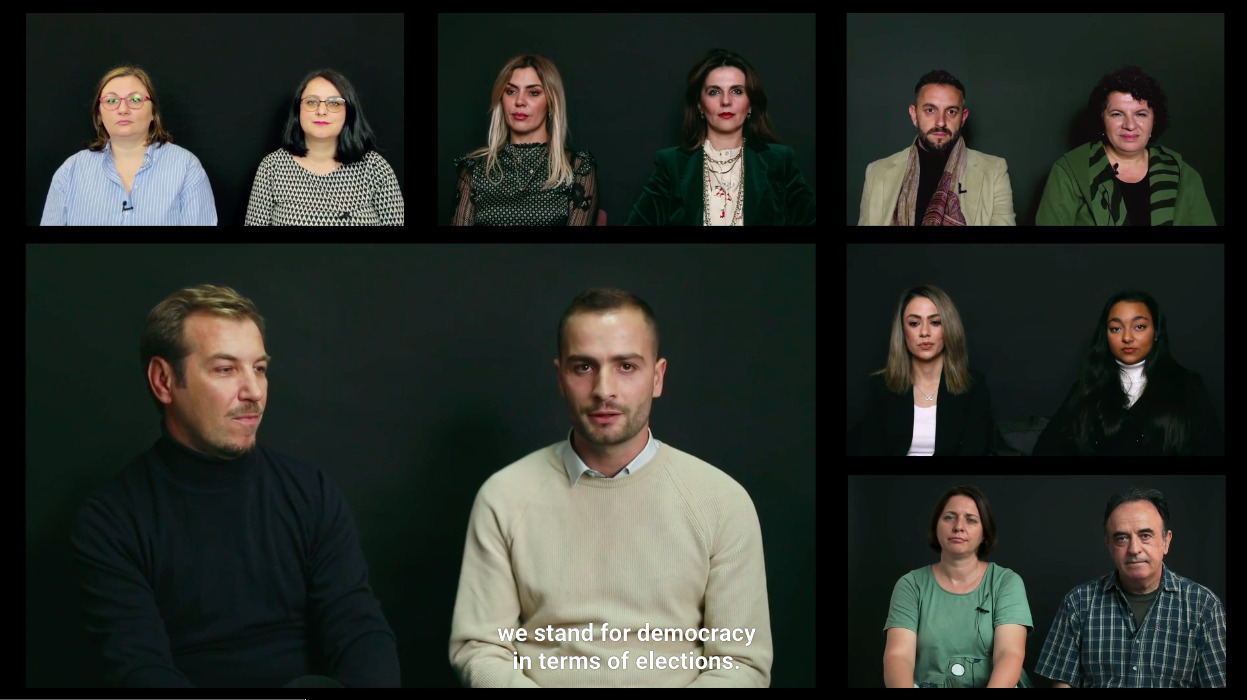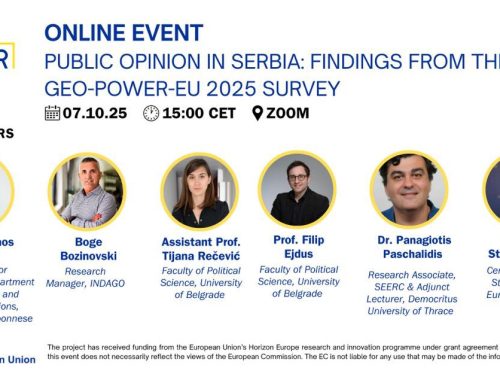Center for Advanced Studies of Southeast Europe of the University of Rijeka, in cooperation with the Museum of Modern and Contemporary Art Rijeka and the City of Rijeka, invites you to the opening of the exhibition Performing Democracy by Ana Adamović and Milica Pekić (Kiosk), in collaboration with Kontrapunkt and DokuFest in ExportDrvo, Rijeka, 28. 10. 2022. at 5 pm.
In the contemporary context of the strengthening of totalitarian and oligarchic tendencies as the collapse of natural conditions for human survival spreads, democracy has become the topic of many conversations, from coffees with friends to international summits, from academic seminars to activist planning. The survival, value, and very concept of democracy are discussed – whether it will survive in a world of insatiable social inequalities and ecological crisis, whether it is even desirable for it to survive since t it failed to defend us from the predatory capital hijacking of the political processes, and whether it can be upgraded to deliver on its complex promise of simultaneously developing freedom and the capacity for collective action. These are just some of the questions that have become uncomfortably commonplace.


The project Performing Democracy faces the tensions of democracy with the fearless belief that fostering a space for broad dialogue, a space for the search for the common ground without hiding from fundamental disagreements, is an indispensable condition of all future freedoms.
We invite you to join us at the opening of the exhibition Performing Democracy, and the conversation. Can we continue to boldly celebrate spaces for public debate on the possibilities of developing democratic culture? Are we allowed to close our eyes to the fact that we are on a planet that suffers the irreversible impact of our actions? Can we isolate ourselves in the local context, in Rijeka, can we change it through our actions?
Performing Democracy is a collective participatory artwork created in cooperation with the citizens of Serbia, Kosovo, and North Macedonia, as a series of conversations and social games with citizens, activists, members of initiatives, and workers’ collectives and political parties. The work is presented as a multimedia installation. The project was initiated by the organization Kiosk, carrying out the first phase in Serbia in 2020, while the second phase was carried out in Kosovo and North Macedonia, in cooperation with the organizations DokuFest from Prizren and Kontrapunkt from Skopje.
Authors: Ana Adamović i Milica Pekić
Editorial team: Ana Adamović, Eroll Bilibani, Iskra Geshoska, Veton Nurkollari, Milica Pekić, Artan Sadiku
Exhibition design and technical production (Rijeka): Damjan Šporčić
Curatorial team (Rijeka): Sanja Bojanić, Tina Perić, Marko-Luka Zubčić, Valeria Graziano
Technical support (Rijeka): Vanja Pužar (MMSU)
Dramatist: Katarina Pejović
Camera: Ana Adamović (Serbia), Elmedina Arapi (Kosovo), Gjorgje Jovanovik (North Macedonia)
Sound: Ana Adamović (Serbia), Alba Çakalli, Vigan Bytyqi, Zana Arapi, Eroll Bilibani, Buron Karahoda (Kosovo), Gjorgje Jovanovik (North Macedonia)
Video post-production: Vladan Obradović
The design and sound post-production: Srđan Bajski, Bojana Ruvidić
Transcripts: Ana Adamović, Milica Pekić (Serbia), Zana Arapi, Nora Fetoshi, Dren Shporta, Fjolla Fetollari, Eroll Bilibani (Kosovo), Marija Jones (North Macedonia)
Translation: Goran Kričković, Milica Pekić, Ana Adamović (Serbia), Fjolla Fetollari, Eroll Bilibani (Kosovo), Marija Jones (North Macedonia)
Design: Isidora Nikolić
The project was supported by: The Balkan Trust for Democracy, The Project of the German Marshall Fund of the USA and the American Agency for International Development (USAID); Allianz Kulturstiftung; Open Society Foundation, Serbia, and the European Fund for the Balkans.
The Rijeka version of the exhibition Performing Democracy is organized as part of the project Cultures of Rejection: Conditions of Acceptability in Socio-spatial and Digital Environments.
UNIRI The Moise Palace: Cres Island
An education center of the University of Rijeka. A five-hundred-year-old patrician townhouse and the largest Renaissance palace on the Croatian islands. A venue and forum for various scientific and research activities, it welcomes visiting academics, students and scholars.





